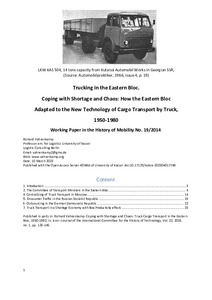| dc.date.accessioned | 2023-04-11T15:47:07Z | |
| dc.date.available | 2023-04-11T15:47:07Z | |
| dc.date.issued | 2023-03-10 | |
| dc.identifier | doi:10.17170/kobra-202304017748 | |
| dc.identifier.uri | http://hdl.handle.net/123456789/14577 | |
| dc.language.iso | eng | eng |
| dc.rights | Attribution-NonCommercial-NoDerivatives 4.0 International | * |
| dc.rights.uri | http://creativecommons.org/licenses/by-nc-nd/4.0/ | * |
| dc.subject | Truck | eng |
| dc.subject | Eastern Bloc | eng |
| dc.subject | Hungary | eng |
| dc.subject | Poland | eng |
| dc.subject | Moscow | eng |
| dc.subject | construction industry | eng |
| dc.subject | centralzation | eng |
| dc.subject | outsourcing | eng |
| dc.subject | on own account | eng |
| dc.subject | truck fleet | eng |
| dc.subject | communist party | eng |
| dc.subject | Khrushchev | eng |
| dc.subject | Kutaissi Automobil Works | eng |
| dc.subject | truck KAS 504 | eng |
| dc.subject | truck W50 | eng |
| dc.subject | German Democartic Republic | eng |
| dc.subject | GDR | eng |
| dc.subject | Committee of Transport Ministers | eng |
| dc.subject | OSShD-journal | eng |
| dc.subject | OSShD | eng |
| dc.subject | Council for Mutual Economic Assistance | eng |
| dc.subject | COMECON | eng |
| dc.subject | truck policy | eng |
| dc.subject | motorway | eng |
| dc.subject | roadlessness | eng |
| dc.subject | shortage economy | eng |
| dc.subject | repair parts | eng |
| dc.subject | repair shops | eng |
| dc.subject.ddc | 330 | |
| dc.subject.ddc | 900 | |
| dc.title | Trucking in the Eastern Bloc | eng |
| dc.type | Working paper | |
| dcterms.abstract | This article explores the tensions during the Cold War between the need to have infrastructure to enable truck transport in the countries of the Eastern Bloc. Using “shortage economy” as the theoretical framework to analyse the Eastern bloc the article shows restrictions the shortage economy imposed on investments in infrastructure. The Western management started in the 1980s to let the enterprises’ transports to be carried out by external truck transport service providers – a policy which is known as “outsourcing”. But also in the Eastern bloc new forms in the organization of truck transport occured, as encounter traffic – a term that will be explained later – and outsourcing. The latter one developed even 30 years before Western management started outsourcing. The producing enterprises were deprived from their own truck fleets and the supply with goods deterioted. The communist leaders were not able to handle the anarchic and subversive character of decentralized truck transport that did not comply to their concept of a centralized economy. Conflicts between authorities that competed to oversee truck transport led to chaos in the overall transport sector and to deterioration in quality of service. | eng |
| dcterms.accessRights | open access | |
| dcterms.creator | Vahrenkamp, Richard | |
| dcterms.extent | 26 Seiten | |
| dc.contributor.corporatename | Kassel, Universität Kassel, Fachbereich Wirtschaftswissenschaften | ger |
| dc.subject.swd | Deutschland (DDR) | ger |
| dc.subject.swd | Ungarn | ger |
| dc.subject.swd | Polen | ger |
| dc.subject.swd | Moskau | ger |
| dc.subject.swd | Lastkraftwagen | ger |
| dc.subject.swd | Bauindustrie | ger |
| dc.subject.swd | Outsourcing | ger |
| dc.subject.swd | Organization of Railways Cooperation | ger |
| dc.subject.swd | Verkehrspolitik | ger |
| dc.subject.swd | Autobahn | ger |
| dc.subject.swd | Reparaturwerkstatt | ger |
| dc.subject.swd | Geschichte 1950-1980 | ger |
| dc.title.subtitle | Coping with Shortage and Chaos: How the Eastern Bloc Adapted to the New Technology of Cargo Transport by Truck, 1950-1980 | eng |
| dc.type.version | updatedVersion | |
| dcterms.source.series | Working Paper in the History of Mobility | |
| dcterms.source.volume | No. 19/2014 | |
| kup.iskup | false | |


